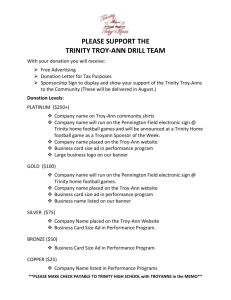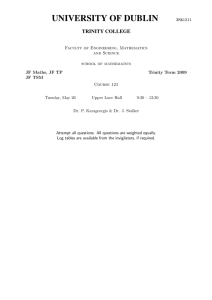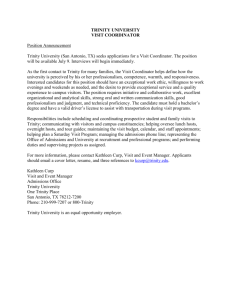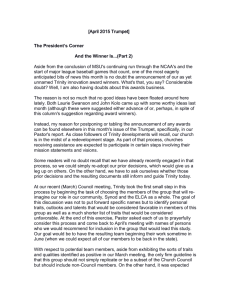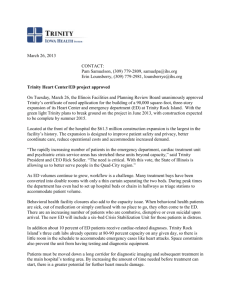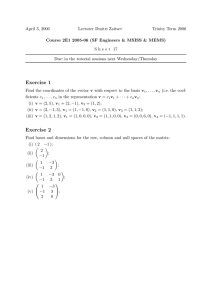Trinity Sunday June 7, 2009 J.A. Loftus, S.J.
advertisement
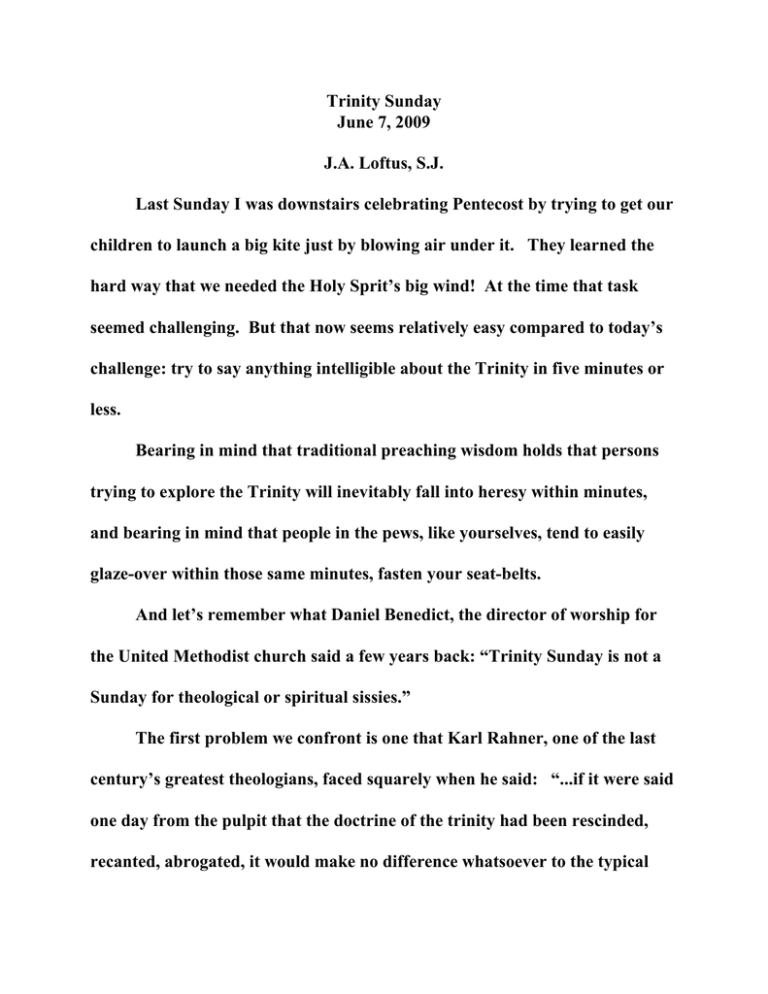
Trinity Sunday June 7, 2009 J.A. Loftus, S.J. Last Sunday I was downstairs celebrating Pentecost by trying to get our children to launch a big kite just by blowing air under it. They learned the hard way that we needed the Holy Sprit’s big wind! At the time that task seemed challenging. But that now seems relatively easy compared to today’s challenge: try to say anything intelligible about the Trinity in five minutes or less. Bearing in mind that traditional preaching wisdom holds that persons trying to explore the Trinity will inevitably fall into heresy within minutes, and bearing in mind that people in the pews, like yourselves, tend to easily glaze-over within those same minutes, fasten your seat-belts. And let’s remember what Daniel Benedict, the director of worship for the United Methodist church said a few years back: “Trinity Sunday is not a Sunday for theological or spiritual sissies.” The first problem we confront is one that Karl Rahner, one of the last century’s greatest theologians, faced squarely when he said: “...if it were said one day from the pulpit that the doctrine of the trinity had been rescinded, recanted, abrogated, it would make no difference whatsoever to the typical person in the pew.” It doesn’t actually seem to mean much to many people– not in concrete ways, not in everyday ways, not in practical ways. It seems like just a complicated piece of theological hair-splitting that nobody really understands in the end anyway. But perhaps there is something important and practical underneath it all. Let’s see. Let’s start with the hair-splitting. Bear in mind the old saying: the Devil is in the details. Because it is details that complicate the theology of the trinity. Little details. So first a story from 40 or 50 years ago, in hey-days of Western Union telegrams as the world’s fastest and most reliable means of communication. Sometimes one little letter can make a huge difference! A wealthy man and his wife were geographically separated–he in New York, she in Paris. She found a beautiful, rare, painting she really wanted; it cost $150,000. So she sent a telegram to New York asking if she could have the painting for her birthday. Her husband personally wrote a telegram back saying: “No (comma), price too high.” The clerk at Western Union goofed and wrote back to the wife, not minding his punctuation : “No price too high.” Oops. Only one little comma missing, but what a difference it made. Now to the theology of the Trinity. The real fine-tuning began almost 1700 years ago. The Emperor Constantine called together a group of bishops 2 in the little town of Nicea in Turkey to finally settle the burning question (yes it was a burning issue in those days) of the divinity of Jesus. Was he really God? Or was he just like God? The whole argument–and it was quite an argument–rested on a single letter in the Greek alphabet, the iota, or letter “I.” St. Athanasius and friends held that Jesus was homo-ousios with the Father, i.e. the same as. In the other corner of the ring was a man named Arius and his friends who held that Jesus was homoi-ousios with the Father, i.e. like the Father. One little letter, “I” difference. The first means “of the same substance” with the Father; the second means “of like substance” with the Father. One little letter difference. Arius was condemned; Athanasius never got to see his victory, however, because Constantine was not amused and banished him. But Athanasius did win. No “I” in homo-ousios. But a theological concept of the Trinity was about to take flight (no pun intended). Once we’ve got the love of the Father for the Son, and the Son’s reciprocation in love for the Father, plus the realization that they are “one in being with each other,” their love itself takes form; it becomes alive and blows through all creation with their spirits. Voila, the Holy Spirit. Any lover and beloved know that their love for each other often takes on 3 a life of its own, and even seems sometimes bigger that either of them alone. We learn that from God, the Blessed Trinity. That’s who God is. Three-inOne. Relationship itself! In a few minutes we will all proclaim together the fruit of that discussion at Nicea 1700 years ago. We will profess our common faith in Jesus Christ, “eternally begotten of the Father, light from light, true God from true God, one in being with the Father.” Have your eyes glazed over yet? Now you have an idea of where the concept of the Trinity comes from. But a problem remains. Ron Rolheiser sums it up well: “...God is not, first of all, a formula, a dogma, a creedal statement, or a metaphysics that demands our assent. God is a flow of living relationships, a trinity, a family of life that we can enter, taste, breathe within, and let flow through us.” God is not an abstraction. But the one in whom everything and everyone has their being. As today’s readings remind us, primarily God is love. Not necessarily the romantic, wedding celebration, that “gooey” creation that sometimes parodies “love.” God is not an emotion, but a commitment. God is community, family, parish, friendship, hospitality. And whoever abides in these, abides in God and God in him or her. In proclaiming a Trinity of life, 4 we proclaim that the reality of our everyday dealings with each other is not “secular,” but is the stuff of church, and the “stuff” of God. We are held in life in a trinity of love. It is in the everyday reality of our dealings with each other that the Trinity lives: At our dinner tables, or even over a bottle of good wine (or single malt scotch as go my personal tastes), in our arguments with each other, or in the simple giving and receiving of hospitality, warmth, openness and tenderness. None of these is ever “secular,” no matter how earthly they may seem. These dealings with each other are the “stuff” of God. God is relationship! These are the Trinity alive and well until the end of the ages. Sometimes simple everyday things like flying kites can be the best theological reflection of all. So enjoy summer! Enjoy kites! Enjoy each other! And sing praise and thanks to the Blessed Trinity. Peace! 5
